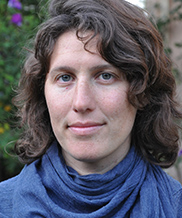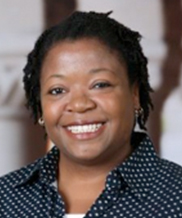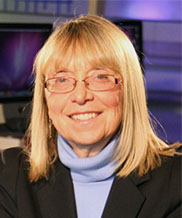Augmenting Intelligence for Thinking and Perception
Keith Devlin, Executive Director of the H-STAR Institute, will moderate a discussion with leading educators and students of education technology on transformative tools and approaches for augmenting critical thinking, sense making and academic engagement. Award winning teacher Esther Wojcicki will reveal her secret sauce for student empowerment, while Stanford researchers will discuss insights from projects exploring peer effects in social networks, social annotation and gamification for mathematical thinking.
 Keith Devlin, Moderator: Augmenting Intelligence for Thinking and Perception. Keith’s current research is focused on the use of different media to teach and communicate mathematics to diverse audiences. In this connection, he is a co-founder and President of an educational technology company, BrainQuake, that creates mathematics learning video games. He also works on the design of information/reasoning systems for intelligence analysis.
Keith Devlin, Moderator: Augmenting Intelligence for Thinking and Perception. Keith’s current research is focused on the use of different media to teach and communicate mathematics to diverse audiences. In this connection, he is a co-founder and President of an educational technology company, BrainQuake, that creates mathematics learning video games. He also works on the design of information/reasoning systems for intelligence analysis.
 Emily Schneider, Co-creating Meaning with Online Annotations. Software design for education can augment collective sense making as well as individual thinking. This talk presents Lacuna, a platform for the social annotation of digital texts. How have students and faculty users experienced Lacuna? How has pedagogy, learning, and course dynamics co-evolved with the technology? Research results from humanities courses at Stanford and Foothill Community College will be discussed.
Emily Schneider, Co-creating Meaning with Online Annotations. Software design for education can augment collective sense making as well as individual thinking. This talk presents Lacuna, a platform for the social annotation of digital texts. How have students and faculty users experienced Lacuna? How has pedagogy, learning, and course dynamics co-evolved with the technology? Research results from humanities courses at Stanford and Foothill Community College will be discussed.
Emily Schneider is a the Director of Research and Pedagogy of the Lacuna project, a co-founder of Stanford’s Lytics Lab, and a doctoral candidate in Learning Sciences and Technology Design. Schneider’s work focuses on the design and evaluation of interactive online learning platforms. Currently, she is developing “critical reading analytics” for identifying and supporting the strategies that learners use when they critically engage with digital texts. More broadly, she is passionate about collaboration, open educational resources, and striking a balance between technology-enhanced and human-centered learning. Schneider a graduate in English Literature from Swarthmore College.
 René Kizilcec, Exploring the Effects of Peer Encouragement in Social Networks. Peer effects, in which the behavior of an individual is affected by the behavior of their peers, are central to social science. A key challenge lies in isolating peer effects from other causes. I will present joint work with Dean Eckles and Eytan Bakshy on peer encouragement designs, a class of experimental designs leveraging randomization to help identify peer effects. ]My presentation will describe our large peer encouragement design project on Facebook, investigating the effects of receiving feedback from peers on posts shared by individuals.
René Kizilcec, Exploring the Effects of Peer Encouragement in Social Networks. Peer effects, in which the behavior of an individual is affected by the behavior of their peers, are central to social science. A key challenge lies in isolating peer effects from other causes. I will present joint work with Dean Eckles and Eytan Bakshy on peer encouragement designs, a class of experimental designs leveraging randomization to help identify peer effects. ]My presentation will describe our large peer encouragement design project on Facebook, investigating the effects of receiving feedback from peers on posts shared by individuals.
René Kizilcec is a Stanford Interdisciplinary Graduate Fellow, co-founder of the Stanford Lytics Lab, and Ph.D. candidate in the Department of Communication at Stanford. His research focuses on cognitive, motivational, and psychological factors influencing academic achievement and scalable interventions to promote achievement and address social inequalities. His work builds on research in social, cultural, and educational psychology and multimedia learning theory. He primarily conducts large-scale longitudinal field experiments in online learning environments, such as Massive Open Online Courses. René holds a M.S. in Statistics from Stanford University and a B.A. in Philosophy and Economics from University College London.
 Holly Pope, Learning Critical Thinking Through Math Games. Tentative abstract – Can digital games augment personal intelligence? Despite the multitude of math games available, few highlight mathematical thinking and problem solving. Similarly, not much research has focused on digital game-based learning beyond speed and basic math facts. This presentation will present a framework for evaluating digital games for children, and discuss the results of a pilot study in which third graders who played a digital math game showed increased mathematical thinking compared to those who did not play the game.
Holly Pope, Learning Critical Thinking Through Math Games. Tentative abstract – Can digital games augment personal intelligence? Despite the multitude of math games available, few highlight mathematical thinking and problem solving. Similarly, not much research has focused on digital game-based learning beyond speed and basic math facts. This presentation will present a framework for evaluating digital games for children, and discuss the results of a pilot study in which third graders who played a digital math game showed increased mathematical thinking compared to those who did not play the game.
Holly Pope is a Doctoral Candidate in Curriculum Studies and Teacher Education, focusing on Mathematics Education. Pope has 18 years of teaching experience from prekindergarten through 6th grade, including 5 years as a math instructional coach in a K-8 urban charter school. Her current research interests include the development of student mathematical thinking from playing a digital mobile game. Other research interests include educational technology, pre-service and in-service teacher education, differentiation practices, curriculum use and development, implementation of the Common Core State Standards, and issues of equity in urban elementary mathematics contexts. Holly has a B.S. in Elementary Education from Geneva College and a M.Ed. in Curriculum and Instruction from Gannon University.
 Esther Wojcicki, The Power of Moonshot Mondays – 20% Time in the Classroom. What is 20% time and how does it empower learners? Educator Esther Wojcicki will discuss how K-12 and college classes can be revolutionized with just a change in teacher mindset. Agency enables students to develop 21st century skills: communication, collaboration, creativity and critical thinking.
Esther Wojcicki, The Power of Moonshot Mondays – 20% Time in the Classroom. What is 20% time and how does it empower learners? Educator Esther Wojcicki will discuss how K-12 and college classes can be revolutionized with just a change in teacher mindset. Agency enables students to develop 21st century skills: communication, collaboration, creativity and critical thinking.
Esther Wojcicki is the founder of the scholastic journalism at Palo Alto High School, now the largest in the nation. Over the past 30 years she built the journalism program from a small group of 20 students in 1985 to over 600 students in 2014 and five other journalism teachers. The program has won major national and international recognition and is a model of how to integrate the curriculum and teach 21st century skills. She is a 2009 MacArthur Foundation Research Fellow for the Student Journalism 2.0 project; the 2002 California Teacher of the Year by the California Commission on Teacher Credentialing; the 2011 Charles O’Malley Award recipient from Columbia Scholastic Press, and holds an honorary doctorate from Palo Alto University (2013). She is Vice Chair of the Board of Creative Commons, Chair of PBS Learning Matters, and on the board of the Alliance For Excellent Education. She is also an adviser to EdSurge, Hapara and shmoop and CEO of ClassBadges.